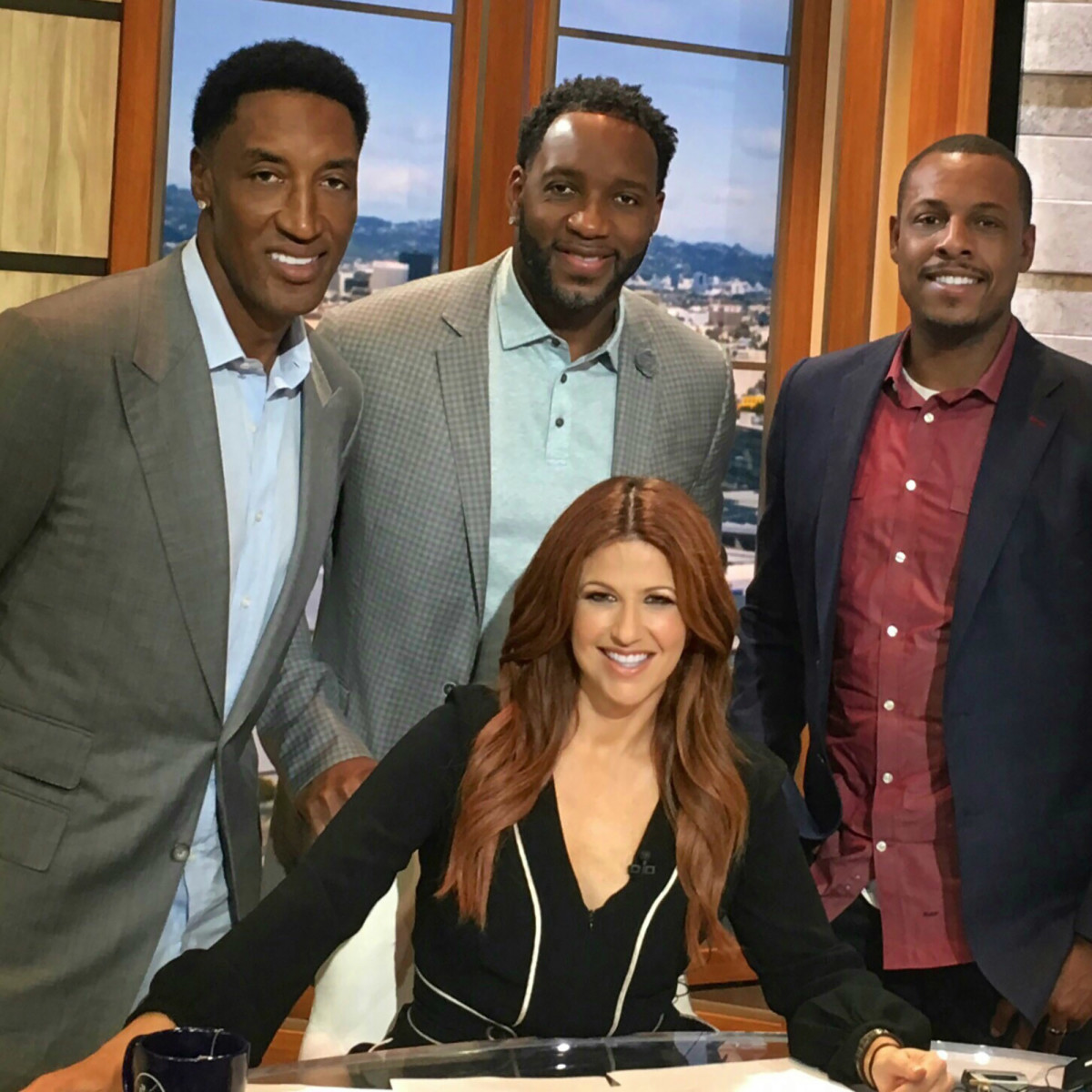How Rachel Nichols Turned ‘The Jump’ Into TV’s Smartest Basketball Show

Some people at ESPN like to joke that Rachel Nichols is the most prolific writer at the company. Nichols, a former reporter for The Washington Post, has been a fixture on TV for well over a decade now. But she still tirelessly crafts a monologue for each and every episode of her show, The Jump, with topics ranging from North Carolina’s bathroom bill and how it relates to the NBA to whether the Thunder should consider trading Paul George. Nichols’s monologues are akin to your favorite sportswriter producing a new column every day, and her well-informed, well-thought opinions are a large part of what have made The Jump the best basketball show on television.
“We’re a basketball show for basketball people,” says Amin Elhassan, a former Suns executive turned ESPNer, who is a frequent panelist on The Jump (weekdays, 3 p.m., ESPN). “Every NBA team when they’re on the road, after practice or shootaround, they’re turning on our show. Coaches, parents of players, even the commissioner—this is the show basketball people watch.”
While ESPN still features its share of carnival barkers, there are plenty of smart, nuanced and accessible viewpoints to be found on the network as well, with The Jump (which launched in 2016) serving as the ideal example. Spearheaded by Nichols, the show is loose, fun, well-informed and filled with a variety of perspectives. Nichols sets the tone, then panelists like Elhassan, Tracy McGrady, and Brian Windhorst—among many others—provide information and analysis colored by their different relationships with the league. Reporters give insights and behind-the-scenes information while players provide color and first-hand examples of life in the locker room for a harmonious blend of basketball talk.
What The Jump may lack in hijinks compared to other popular NBA shows, it makes up for in its smart discussions. It refuses to dumb down conversations about what's happening on the court (there are no diatribes against the three-point shot here) or dance around sensitive topics either (like the Hornets’ decision to take Stephanie Ready out of the broadcast booth). Everyone who appears on the show is well connected within the NBA, and more importantly, they’re all doing more than simply watching games from the couch and spewing opinions. Amid all the nuance and analysis is a sense of humor, as the show manages not to take itself too seriously.

“We’re not tied to any game, we don’t have to be a pregame show or a postgame show, we can just have a conversation about basketball,” Nichols told The Crossover earlier this month. “I am never trying to be doing glossy TV. We interrupt each other on our show, we have our warts and all. We are not presentation television.”
The show is built around Nichols’s vision. She came up with the title, and she pitched very specific ideas on how she wanted to do things when then-ESPN president John Skipper recruited her back to the network from Turner Sports in 2016. The result is a show that doesn’t shy away from modern analysis of basketball (The Jump is a safe space for analytics) and also isn’t afraid to have in-depth conversations about social issues surrounding sports. It’s also inviting, with a relaxed set and less buttoned-up feel than similar ESPN offerings.
Few people are well-equipped as Nichols to pull off the balancing act. She herself is a well-rounded journalist, with a background in print, and years of experience on TV covering multiple sports for multiple networks. As the leader of the show, she creates an environment for her different panelists to feel comfortable. It’s not often you’ll see a reporter and a former player having a respectful conversation on the same set, but The Jump is built on mutual respect. Writers like Ramona Shelburne and Lee Jenkins are as valued contributors as former players like Byron Scott and Stephen Jackson.
McGrady, a basketball Hall of Famer, only joined the show because of his reverence for Nichols.
“I had no interest in doing TV,” McGrady told The Crossover. “But I couldn’t turn it down when Rachel Nichols called my name. When I was first sitting at the table with Rachel doing the show, I was a little intimidated. She knows her s---. She’s very knowledgeable.”
Nichols’s respect throughout the NBA can be easily documented in the number of high-profile interviews she conducts every year. From LeBron James to Kristaps Porzingis, a sit-down with Nichols is practically another benchmark for an NBA player. On The Jump, Nichols’s skills as an interviewer are less at the forefront than her skills as a commentator. In basketball terms, Nichols’s role isn’t to set up the offense and go stand in the corner. She’s the star.
“It’s her show, no one is under any illusions otherwise,” says Elhassan. “She isn’t a passive player, she’s taking charge and leading the conversation. Everything we do, it all starts with her and her willingness to foster this environment.”
For Doris Burke, Having Game Is All That Matters
There’s an element of scrappiness to The Jump. McGrady, though he had done some work for NBA TV, wasn’t an oft-discussed name when it came to television gigs until Nichols tabbed him for the show. Elhassan was looking for a scouting job when ESPN reached out to him a few years ago, and he made his way onto TV through sheer force of personality. It’s clear that Nichols wants people of diverse backgrounds around her, which is another element that elevates her show above others.
And having a woman front and center who not only hosts but also gives her opinions is still somewhat of an anomaly on sports television. Nichols doesn't shy away from tough topics (you may remember her bringing the hammer down on Floyd Mayweather and Roger Goodell), which makes her the ideal candidate to break barriers. Nichols says she does not feel pressure despite being perhaps the most prominent female sports journalist in America. Instead, she believes she’s earned trust with viewers and co-workers alike by always being straightforward in her work throughout her career. That straightforwardness ultimately helped her build the smartest basketball show on television.
“John Skipper was pretty aggressive about getting me back, but I was very specific about this show and the role I wanted,” Nichols said. “John, Connor Schell and Kevin Wildes made the leap, and I couldn’t ask for anything more. I’m lucky.”
